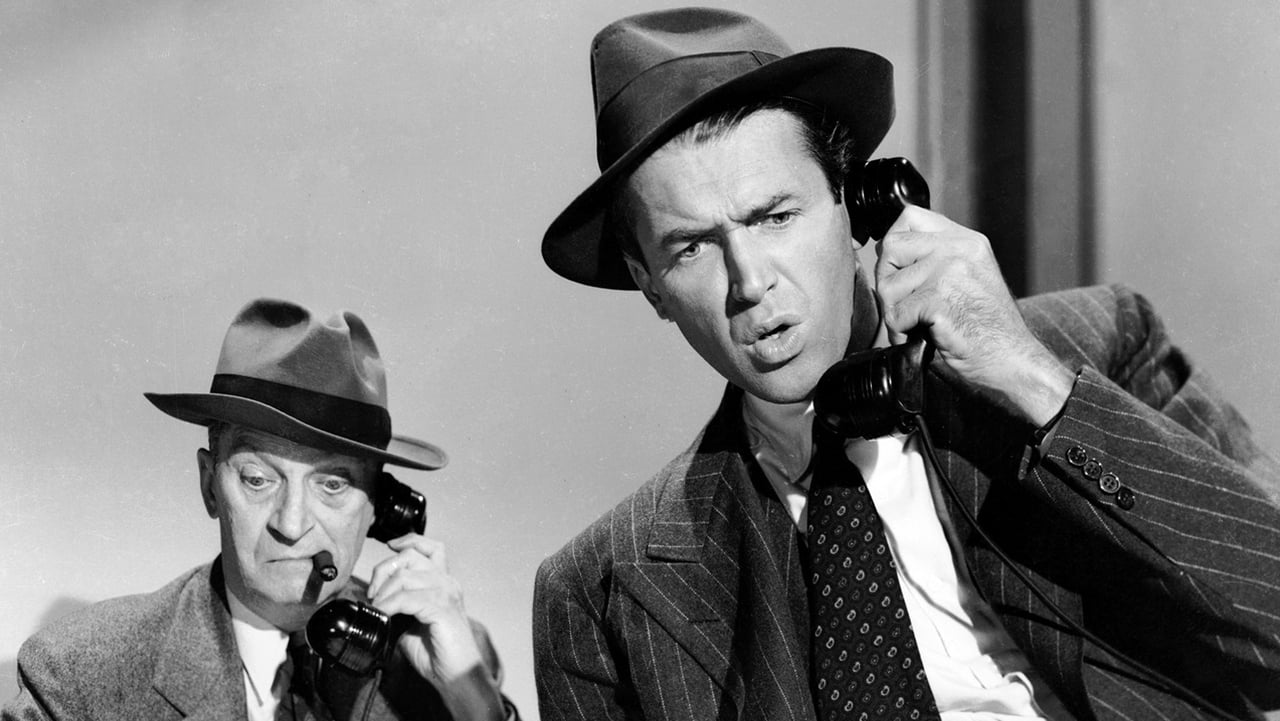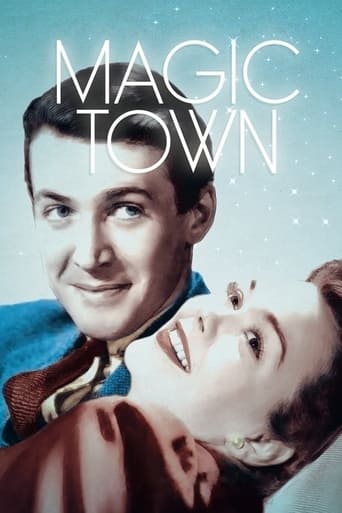



Nice effects though.
Deeper than the descriptions
Blending excellent reporting and strong storytelling, this is a disturbing film truly stranger than fiction
View MoreA terrific literary drama and character piece that shows how the process of creating art can be seen differently by those doing it and those looking at it from the outside.
View MoreOkay, I'll admit the plot is silly and contrived. Sure, the idea of an actuary determining that there is a "perfect" city that is actually statistically represents America in a microcosm is silly. And, their plan NOT to tell anyone in the town but surreptitiously poll just these townspeople in order to find out what America thinks about a wide variety of issues is far-fetched. BUT, with Jimmy Stewart and Jane Wyman as well as William Wellman's direction, who cares?! This is one of those "just sit back and enjoy" pictures that isn't particularly deep but that is charming and great fun to watch. And I think we need a few films like this now and again.
View More"Magic Town" is a film about something that we nowadays take as normal but which was a novelty in 1947. It was about the new "science" of public opinion polling. This was only understood poorly and not only by the public but by those who actually mattered: the politicians who would grow to need them. In 1936 the Literary Digest, a popular magazine of the day, had conducted a poll of it's membership on who would win the Presidency. It concluded that Governor Alfred Landon of Kansas, a capable man, would beat incumbent President Franklin Roosevelt. Unfortunately the readership of the Digest were upper class, and basically Republican (as Landon was). In November 1936 FDR won one of the biggest landslides in political history, with three quarters of the popular vote and all the electoral votes except for those of Maine and Vermont. Literary Digest went out of business shortly afterwords. In the decade since Roper and Gallup had been improving polling techniques, but the full system was still uncertain. In the 1948 election there would be another polling snafu, with most of the polls awarding the election to Governor Thomas Dewey of New York, as opposed to incumbent President Harry Truman. Harry won a remarkable come-from-behind over Tom, and enjoyed showing off a headline from the Republican "Chicago Tribune" saying that Tom won.In the midst of all this there was a classic sociology study entitled "Middletown". Set in the typical mid-American town (it was in the Midwest) the authors (a husband and wife team) showed how it's citizens opinions mirrored what mid-America believed. Ten years later the same authors published a follow up study of the town, and it turned there was little change in the opinion differentials between the town and the country.It is with the "Middletown" study that the background of this film was based. Jimmy Stewart and his assistants (including Ned Sparks and Donald Meek - in his last role) are pollsters, and Stewart has a theory he has been working on that would save pollsters millions. He believes there is a perfect community in the middle of America that can be used for polling it's citizens. He has been studying the problem for several years, and he has found a town where the percentages of the opinions of the citizens perfectly mirror those of the American people as a whole. Stewart goes to the town and sets up there with the intention of using the citizens as his poling guinea pigs, but (as the movie progresses) he gets involved with Jane Wyman and the others in the town. When Wyman discovers Stewart's plans she reveals them, and the town goes crazy. Their sudden unofficial power goes to their heads, and instead of giving the sensible polling answers to questions they give outlandish ones. This causes the crash of their reputation, and the crisis of the film.It is a first rate film and has some nice touches (including Gabriel Heater intoning on the radio). As an early story regarding the polling industry it is unique, and the film is well acted and directed (by William Wellman). Perhaps not a Capra movie, but it is a nice one all the same.
View MoreMaybe the silliest story ever to make it onto the silver screen. James Stewart plays a pollster looking for a town of such mathematical perfection that, whatever you polled its people, it would reflect exactly what the entire nation would feel about a give subject. He finds this place in Grandview, and there he takes his team. When Stewart finds local newspaper editor Jane Wyman trying to convince the town council to build a new civic center, he butts in. If the town were to change at all, its magical polling phenomenon could fade. Similar to The Music Man, Stewart develops a relationship with Wyman to keep the town as it is. Fortunately, it's less cynical and fake than the relationship between the two main characters of The Music Man, and, where Robert Preston's love still seems suspicious by the end of that film, Stewart's feels genuine quickly. He doesn't want the miracle to end, but he is utterly seduced not only by Wyman, but also by the small town. When the town discovers their perfect polling ability, they screw it up pretty much instantly (79% of the population say they would vote for a woman president!). The town goes down the toilet, and it's up to some faithful citizens, joined by the reformed Stewart, to save it. As ridiculous as the initial concept for Magic Town is, it gets even worse near the end. Stewart did this film directly after It's a Wonderful Life, and the small town sentiment is nearly identical in both films. While the first touches me, it's simply schmaltzy in Magic Town. The performances by Stewart and Wyman, as well as many decent supporting performances from many ever-reliable character actors, are better than the movie deserves. Stewart, in particular, is great. I've never seen this guy give a bad performance, and he throws himself behind this awful script with his full soul. He almost got me to buy it. Wyman's beautiful eyes enchanted me. But in the end, the story was just too ludicrous. 6/10.
View MoreCertainly not one of the great comedies, but charming and rather whimsical in its own way. In this day and age of raucous and crude humour (if you can call it that), a movie like "Magic Town" will probably seem hopelessly old-fashioned and dated, but for those who prefer a quieter and more gentle humour, "Magic Town" will fill the bill very nicely. Very Frank Capra-like (not surprisingly since screenwriter Robert Riskin collaborated with Capra numerous times), "Magic Town" reminds us of a by-gone era, a time when living in a small town meant knowing your neighbours, pride in your community, and the moral values of common decency and humility were still part of everyday life. James Stewart as the pollster who discovers a town full of people whose opinions exactly mirror the national thinking gives his customary good performance, as does Jane Wyman as the newspaper publisher who wants to see change in the town. Many well-known character actors (Kent Smith, Wallace Ford, Ann Shoemaker and particularly Ned Sparks) provide capable support. A slight offering, perhaps, but quite worthwhile.
View More